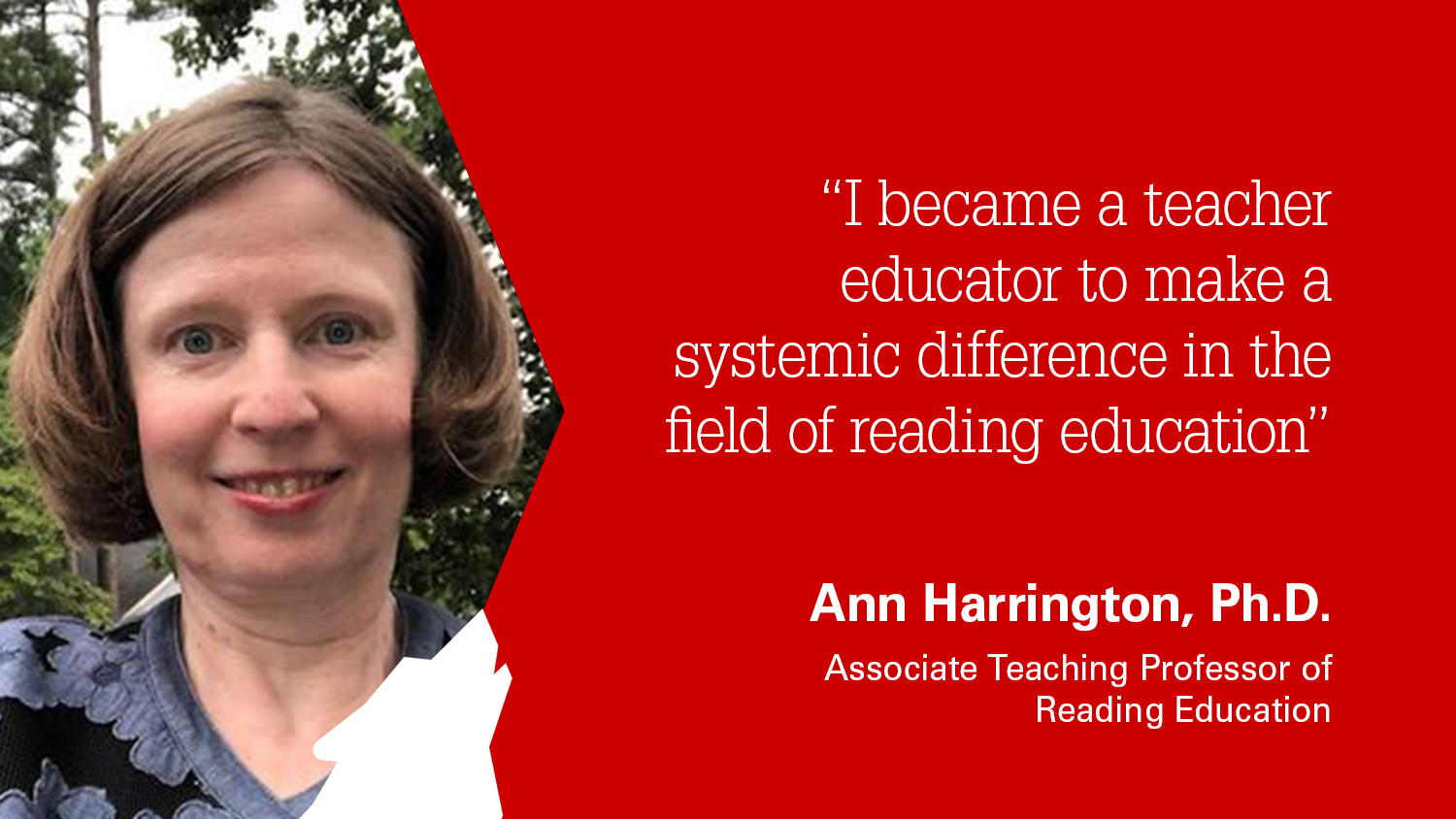Students on Associate Teaching Professor Ann Harrington: ‘She Just Wants Every Student to Succeed and Become an Excellent Teacher’

Keisha Schmitt ‘22 said that she is eager to recommend books and help her future elementary students find a love for reading thanks to a project from NC State Associate Teaching Professor of Reading Education Ann Harrington, Ph.D., that allowed her to explore children’s literature for students in grades 3-5.
“This project reignited my love and passion for reading but it also introduced me to books that I can suggest to my future students with the hope that I will ignite or reignite their passion for reading as well,” she said.
As the instructor for reading methods courses in the College of Education’s elementary education program, Harrington teaches pre-service educators the evidence-based skills and strategies they need — including phonemic awareness, phonics, structural analysis, fluency, vocabulary and comprehension — to help elementary students become effective readers. She also helps them to learn the importance of using diverse, quality children’s literature and other texts for optimal literacy instruction as well as how to incorporate digital tools that can support elementary readers.
When working as a first-grade teacher in a high-poverty elementary school, Harrington saw firsthand how crucial it is to teach children how to read effectively early on, which inspired her to become a reading educator and study the best ways to teach children how to read well.
She served as a co-principal investigator on the Wolfpack WORKS (Ways to Optimize Reading/Writing for Kids Statewide) literacy initiative, which concluded in the summer of 2021. Designed using 10 evidence-based literacy practices, the Wolfpack WORKS initiative supported about 460 beginning K-2 teachers and about 11,000 K-2 students in 15, high-needs districts in North Carolina since it began in 2018.
Based on the data available and collected through an independent evaluation, Wolfpack WORKS helped to improve reading proficiency and reduce performance gaps, most significantly among male students and students with higher literacy needs in first grade, during the first year of the initiative.
“I became a teacher educator to make a systemic difference in the field of reading education. Through Wolfpack WORKS, it is gratifying to know that we are making a positive difference in the lives of children and teachers across North Carolina,” Harrington said.
When teaching pre-service educators in the College of Education, Harrington’s courses are grounded in current and established reading research and evidence-based practices. She ensures that the material she shares with her students address national and statewide mandates related to literacy, including Read to Achieve, and promotes their understanding of the need to develop both childrens’ reading skills and reading wills.
Having worked as a classroom teacher, an English as a second language teacher and a reading specialist in North Carolina elementary schools, Harrington draws on her own experiences with the constraints and challenges of classroom instruction to help her students understand what the “real world” of teaching will look like.
Schmitt said she got insight into what K-2 literacy instruction looks like when one of Harrintgon’s lessons helped her to learn how to group and create plans for students based on their word study stage (word study is an approach to teaching word identification skills and strategies, including phonemic awareness, phonics and spelling instruction). As a student working toward a dual licensure in elementary education and special education, she said the project also helped her to learn how to better differentiate instruction.
Although Harrington understands the importance of ensuring her students are prepared with the knowledge and skills needed to enter the classroom, she also knows that her students won’t care about what she knows unless they know that she cares.
“Building a strong and supportive classroom community is key. I hold high expectations for my students and couple those high expectations with high support,” she said.
When Harrington noticed that she was getting emails from students at odd hours of the night, Kate Wehrheim ‘22 said, she took a few moments of class to remind students to put an emphasis on their mental health and take care of themselves.
She also starts off each class with a “mindful minute,” where students take some time to sit quietly and meditate and focus on their purpose and the reasons they want to become educators.
“Not only is she there to support during hardship, but she is a professor who you can share personal victories with and she shows such a genuine interest in and support for you,” Schmitt said. “Dr. Harrington pushes students to do their best. At times it may seem like she is a ‘hard’ professor, but really she just wants every student to succeed and become an excellent teacher.”
“She is constantly putting her students before herself and I know without a doubt in my mind that she would go to the ends of the Earth for each and every one of us,” Wehrheim added.
- Categories:


